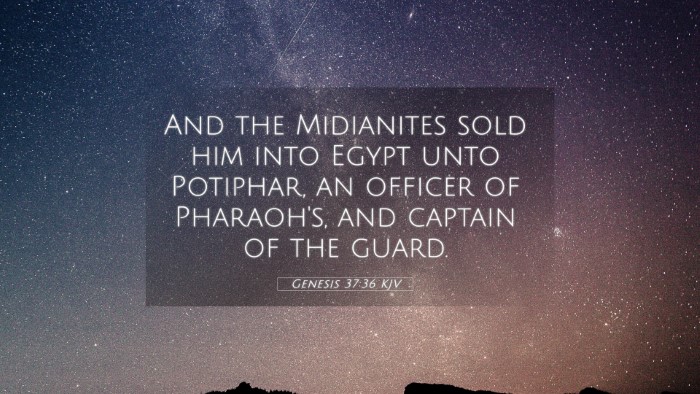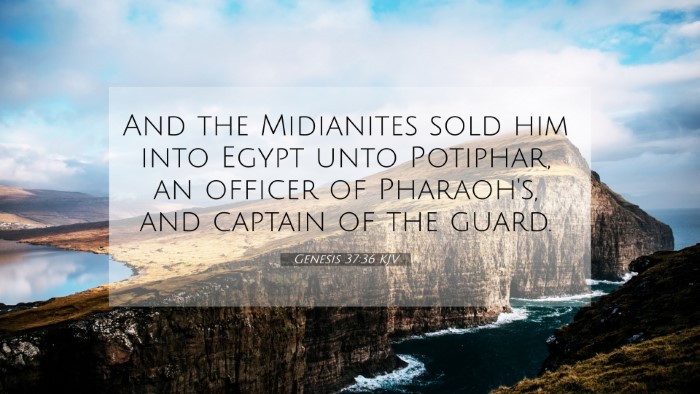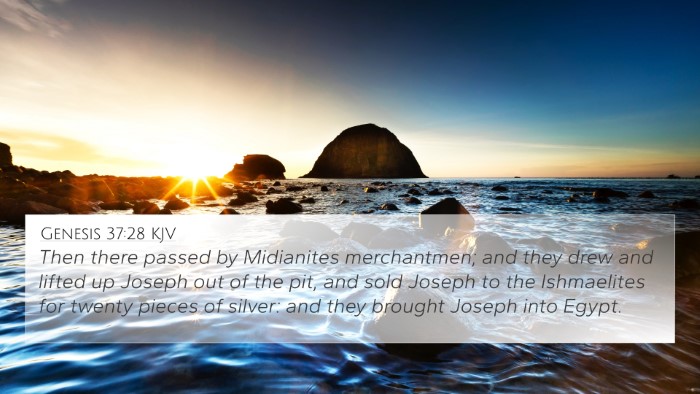Understanding Genesis 37:36:
Genesis 37:36 reads: "And the Midianites sold him into Egypt unto Potiphar, an officer of Pharaoh's, and captain of the guard." This verse is a crucial part of the narrative concerning Joseph, a figure whose story is pivotal in the biblical text. To understand its meaning, let us explore insights from various public domain commentaries.
Summary of Insights
The event in this verse marks a significant moment in Joseph's journey, filled with conflict, betrayal, and ultimately, God's divine plan. Here, we find ourselves at a turning point that emphasizes not only the historical context but also moral and theological implications.
The Historical Context
- Matthew Henry: This commentary highlights the cruelty of Joseph's brothers in selling him into slavery, which serves as a backdrop for discussing the themes of jealousy, treachery, and consequence. Joseph's descent into Egypt is not merely geographical; it symbolizes a plunge into trials and hardships.
- Albert Barnes: Barnes elaborates on the importance of Potiphar as a significant figure in Pharaoh's court, emphasizing the providential hand of God in Joseph’s life. By being sold to such an influential man, the groundwork is laid for Joseph’s eventual rise to power despite his current unfortunate circumstances.
- Adam Clarke: Clarke offers a perspective on the Midianites and their role in Joseph's life, seeing them as instruments in the broader narrative of God's plan. This commentary invites readers to view the complexities of human actions contrasted with divine orchestration.
Thematic Considerations
Genesis 37:36 allows us to reflect on several crucial themes relevant to biblical studies:
- Divine Providence: The verse illustrates God's sovereignty over human actions, showing how even ill-intentions can serve a greater purpose.
- The Consequences of Sin: The actions of Joseph's brothers lead to a series of events that result in both suffering and ultimate redemption, emphasizing the painful results of unethical behavior.
- Preparation for Leadership: Joseph's trials are foundational for his future roles, suggesting that preparation often comes through challenges.
Bible Cross-References
The connections between Bible verses enhance our understanding of this passage. Here are notable cross-references:
- Genesis 39:1: Highlights Joseph's position in Potiphar's house, furthering the narrative of his rise despite adversity.
- Acts 7:9-10: Stephen references Joseph’s story while addressing the Israelites, connecting the themes of envy and betrayal.
- Psalm 105:17-19: Reflects on how God sent Joseph ahead to save many, linking back to the themes of providence in his suffering.
- Romans 8:28: A theological parallel emphasizing that in all things, God works for the good of those who love Him, resonating with Joseph's experiences.
- 1 Peter 2:19-20: Discusses suffering for doing good, drawing connections to Joseph’s unjust treatment.
- Hebrews 11:22: Joseph's faith is highlighted, reminding readers of his belief in God's promises despite immediate hardships.
- Genesis 50:20: Joseph himself later reflects on the actions of his brothers, affirming the idea that what was meant for evil, God intended for good.
Tools for Bible Cross-Referencing
A comprehensive understanding of scripture often requires the use of effective tools for cross-referencing. Here are helpful resources:
- Bible Concordance: A tool that lists occurrences of key words, facilitating the discovery of related verses.
- Cross-reference Bible Study: Methods that allow in-depth exploration of thematic connections throughout the scripture.
- Bible Cross-reference Guide: A systematic resource helping to identify interconnections and parallels.
- Comprehensive Bible Reference Materials: Books and digital tools that provide thematic studies and insights.
Inter-Biblical Dialogue
The account of Joseph relates to numerous other scriptures, enriching the biblical narrative through inter-textual dialogue. This encourages readers to explore:
- How the themes of betrayal in Genesis contribute to the understanding of redemption in the New Testament.
- Identifying connections between Old Testament figures and their New Testament counterparts to reveal a cohesive biblical story.
- Analyzing the links between the narratives of Joseph and Jesus, focusing on themes of suffering and redemption.
- Exploring parallels in the responses of both Joseph and Jesus to suffering and injustice.
Conclusion
Genesis 37:36 invites readers to delve into the themes of divine providence, the consequences of human action, and the preparation for God’s plan through adversity. Through comprehensive study and cross-references, one can understand not only Joseph's story but the larger narrative of salvation woven throughout the Bible.
Engaging with related verses and commentary enriches one’s comprehension and appreciation of the biblical text, fostering deeper insights into the connections that bind the scriptures together.









